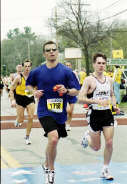Marathons Part 2

In my first marathon I was all alone for most of the second half of the race. The last 5 miles or so were really lonely. With about 3 to go I was in bad shape and had no idea what was going to happen. As I ran along begging God to get me out of the predicament I'd gotten myself into I heard footsteps behind me. I checked over my shoulder (a reflex, as though I would some how speed up to fend off this challenger, not a chance!) and saw a man I hadn't seen yet that day. He pulled up beside me and ask how I was doing. I have no idea what I said, I'm sure it wasn't particularly coherent. I managed to ask if he was in the race (always a competitor at heart), he said he wasn't, just out running that morning (this race wasn't on a closed course, so there was an occasional non-competitor along the way). He sensed that I was hurting and asked if he could run with me, I agreed and thanked him. He ran (loosely speaking) stride for stride with me to the mile 26 mark (from which we could see the finish line) at which point he said he should step off the course and be on his way. He then gave me one last bit of encouragement and I never saw him again.
I've always appreciated that guy. I am naturally skeptical of miraculous claims that people make (though some are legitimate no doubt), but that was a moment that affirmed for me my belief in divine appointments. I do believe that God brought that guy across my path that day. I also learned a lesson that day about the importance of encouragement. Since then I've tried to be more intentional about encouraging other runners, particularly if they look like they're hurting during a race. This realization also applies to encouraging others in life, not just in marathons.
There are three things I think that story highlights that are central to running marathons as well as life in general.
1. Preparation - I have known people who managed to run a marathon without really preparing the way they should have. I don't recommend it. Your experience with the marathon will not be as positive, you may or may not finish, you are more likely to get hurt, and you certainly won't achieve your potential if you don't prepare. Life is the same way. We may make it through life without preparing, but there are always consequences.
Generally speaking I don't recommend running a marathon unless you've completed a pre-race training run of at least 19 miles. You will be better off on race day if you have completed multiple training runs of 20+ miles (I've done it both ways). My self-designed training program (always a Cowboy) developed to have 3 or 4 at 18 miles, 2 at 21 miles and 1 or 2 at 24 miles. I certainly didn't do that many before my first marathon, which is probably why I was hurting so badly near the end of that race.
How you should prepare for life will depend greatly on who you are and what your goals are. You don't run 80 miles/week if you're training for a 100m dash. It wouldn't make a ton of sense for me to spend all my time learning about topics completely unrelated to every aspect of my life. What we read, what we study, the relationships we develop and how we approach those relationships should mirror our goals in life. Spending time reading the Bible and praying is important to me, it helps me prepare for my day. Each of us have to figure out how best to prepare ourselves for what lies ahead, failing to do so hurts us and potentially those close to us as well.
2. Determination - I'd like to avoid a rah-rah speech, I tend to roll my eyes when others give them. But let's be honest, you don't finish a marathon without being pretty determined to do so. The human body wasn't really built to run 26.2 miles, the first guy recorded as trying to do so died shortly after delivering the message he ran that distance to bring (his run was actually a little shorter, probably 24.8, distance was changed to suit the royal family in England much later). When your body decides it's done between miles 20 and 23 you'll have to be pretty determined to finish.
I think setting goals comes into play here. I always set 3 goals for a race. One is a worst-case, if all else fails goal (finish the race). Number two is an average goal (a time I feel confident I can manage if nothing goes horribly wrong). The final goal is a stretch goal (usually a finish time that would be a personal record). Having some defined goals helps when the going gets tough.
The translation from marathon to life is pretty easy here. Very little in life worth accomplishing gets done without effort and determination. I know, that's deep! I do think the goal setting applies to life as well, it's easy to just float along without some idea where you're headed. How you set those goals and what they are will vary. For me, I try to set my goals based on where I feel like Christ is leading me. Yearly goals usually relate to things I want to improve in my life. Longer-term goals tend to relate to the overall direction I believe He wants for my life.
3. Faith - I mentioned last time praying at the finish line. The time I thought the medic was going to cart me off was in Boston. That was a moment that was years coming. The course that led me to that moment was set in motion more than 2 years earlier and a lot of steps had been taken along the way. Getting to that race, finishing it, running it well was a goal I had set and then trusted that God would bring about if that was His will. While I don't think any of my running accomplishments are vastly important in the grand scheme, I was certainly very thankful for His provision and strength that got me to that point - hence I stopped to acknowledge my thankfulness.
Marathons have taught me an important lesson about faith, perhaps because the lesson plays itself out in a tangible way. When you hit "the wall" (the point where your body says, "no more") a lot goes into finishing the race. I mentioned determination, that's part of it. For me, it is also a fairly painful object lesson about being in a vulnerable situation way beyond your own ability to endure and having to rely on Christ for the strength to continue. Now there's a flaw here, lots of people run marathons who claim no dependence on Christ. My point isn't that only Christians can run marathons. My point is that for me, being in that situation gave me a tangible opportunity to learn to trust. How does that translate to life? When I find myself in some other life situation with no other source of hope or strength I have had the experience of relying on Christ in a relatively small and inconsequential situation (well several now), which only builds confidence and faith in Him for the bigger more momentous situations in life.
This post has gotten way too long. There are lots of tips I could give for race preparation and the event itself. Most of those are readily available from far more credible sources who know more about it than I do. I'll leave you with one final piece of advice:
The top of "Heartbreak" is at mile 21, it is downhill from there, but you're not home until you pass the Citgo sign at mile 25. From there the crowd will carry you.


0 Comments:
Post a Comment
<< Home